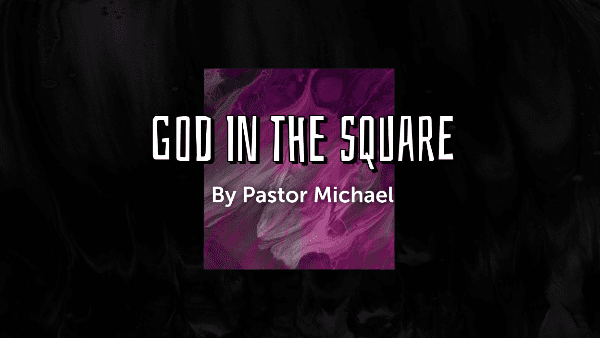Namaste is an incredible Greenwich Village book and spiritual trinkets store. It’s an awe-filling library of spiritual literature from nearly every tradition on the planet. Being surrounded by such a wealth of human mystical wisdom is a holy, sensory experience. Namaste is a sanctuary of spiritual learning and a physical reminder that religious diversity can coexist. On bookshelves, anyway.
I left the store one hot summer day and my shoes immediately gummied to the blistering sidewalk. The only noticeable breeze was coming from nearby Union Square, where the sidewalk preachers were lined up blathering about salvation, a noisy yin to Namaste’s peaceful yang.
I admit, as much as the peace of a place like Namaste appeals to me, I am also drawn to the chaos of Union Square, which reminds me of the Areopagus, where Paul preached to a Greek crowd so religiously tolerant, so open-minded, that they even had a statue or an altar to an unnamed God out of respect for any gods they weren’t aware of. I think it’s honest curiosity and a sense of academic duty that prompts the council to invite Paul to speak. They want to know what he believes — not to arrest him, not to stone him, but to learn.
Acts 17:22–30 (CEB)
Paul stood up in the middle of the council on Mars Hill and said, “People of Athens, I see that you are very religious in every way. As I was walking through town and carefully observing your objects of worship, I even found an altar with this inscription: ‘To an unknown God.’ What you worship as unknown, I now proclaim to you. “God, who made the world and everything in it, is Lord of heaven and earth. He doesn’t live in temples made with human hands. Nor is God served by human hands, as though he needed something, since he is the one who gives life, breath, and everything else.“From one person God created every human nation to live on the whole earth, having determined their appointed times and the boundaries of their lands. God made the nations so they would seek him, perhaps even reach out to him and find him. In fact, God isn’t far away from any of us. In God we live, move, and exist. As some of your own poets said, ‘We are his offspring.’
“Therefore, as God’s offspring, we have no need to imagine that the divine being is like a gold, silver, or stone image made by human skill and thought. God overlooks ignorance of these things in times past, but now directs everyone everywhere to change their hearts and lives.”
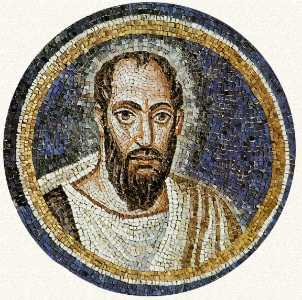
So eloquent! So convincing! Paul doesn’t scream or yell. He appeals to the people intellectually and spiritually by directing them to a God who isn’t an unchanging static statue made by humans. Paul describes God as an entity in whom we “live, move and exist.” Paul’s God is personal, approachable, and dare I say? Quantum. Paul describes a Conscious Universe in which we all live and breathe. God isn’t far away from any of us. Paul preaches love, unconditional and pervasive. It would have sounded as revolutionary to the ancient Greeks as it does to us.
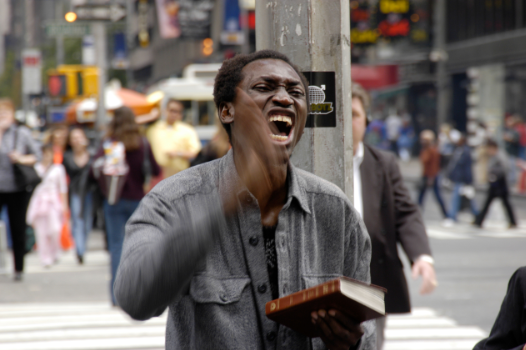
As I’m thinking about Paul, the Areopagus, and all these other things I hear, “REPENT!” An Evangelical screamed so loudly it knocked me out of my incense and book-induced reverie. Why would he yell that at me? Doesn’t he know I’ve been walking all this way thinking about Paul, someone from whom this guy could apparently use a few lessons?
I looked up to see the barker had the microphone halfway in his mouth and spewing so vehemently that his voice distorted the loudspeaker. He was making a lot of noise about Jesus and hell and God damns this and God condemns that. He screeched into the mic, his mouth frothing: “Accept Jesus Christ or suffer eternal torture in Hell! There is only one God, and his name is Jesus Christ! Jesus said, ‘Nobody gets to the Father but through me!’”
Distortion, distortion, distortion.
I walked past him, sat on a step to watch the show and, probably for the first time in my life, wished I were watching Paul. Or anyone who could make a cogent argument. Usually, the rest of the religious folks with booths in the park — Muslims, Hare Krishnas, a couple of stray Scientologists, Mormons of course, a wandering Jew here and there, can only take the obnoxiousness for so long before someone tries, usually to no avail, to get them to at least quiet down, if not stop altogether.
I’ve no sooner thought this when a group of Muslims set up under a marketing tent with a giant sign proclaiming “THERE IS ONLY ONE GOD, ALLAH,” right next to the zealots shrieking the same thing about Jesus. Only, instead of yelling and screaming at people through a crackly boom box, the Muslims start quietly passing out free Qur’ans, brochures about Islam — including Islamic beliefs about Jesus — and calmly rebuffing the Evangelicals, speaking into their own mic so all can clearly hear even through the evangelical static: “There is only one God, Allah, and his prophets are Mohammed and Jesus Christ, peace be upon them.”
No distortion.

Then, the Muslims invite passersby into a conversation. Many people stop to chat, some sit down for quite some time.
In response, the Evangelicals shout louder, accusing the Muslims of following a false religion, saying offensive things about hell and Mohammed (pbuh) and it’s just horrifying. They scream over the Muslims and then, a giant gust of wind suddenly topples the Muslim’s tent right into the Evangelical’s loudspeakers. Everyone had to shut up and scramble to collect their goods.
And they say God is dead.
In the blessed silence those of us watching the spectacle from the stairs heard the never-ending chant of the Hare Krishna’s reciting the names of God. The sublime mantra began weaving its magic around the park, redirecting our focus to God and forcing us to think of God by names other than Jesus or Allah: Hare Krishna, Hare Krishna, Krishna Krishna, Hare Hare/Hare Rama, Hare Rama, Rama Rama, Hare Hare.
The music calms everyone and as the park resets, I wonder if some of the confusion between the Evangelicals and Muslims in the square is a mostly semantic misunderstanding of monotheism.
There are different forms of monotheism. In general, it’s the belief in a single God that is source and sovereign of all things. There are no minor gods or other deities. People who believe in Satan are not monotheists because Satan is separate from God. Some people who profess belief in Jesus are not monotheists either, because they think of Jesus as both part of and separate from God. It’s that idea of Jesus as a separate divine being — as the literal “son” of a divine being — that the Muslims correctly argue is not monotheism.
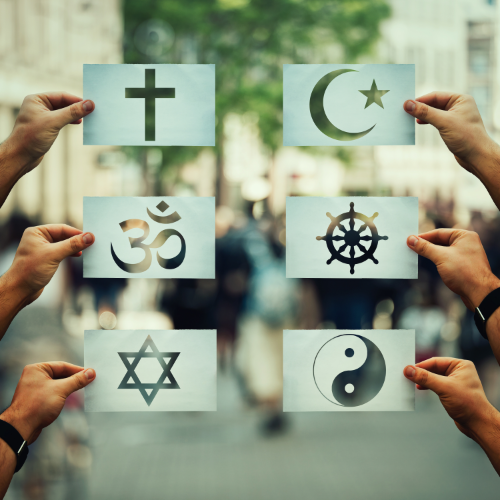
But wait, there’s more. Most monotheists are inclusive, or pluriform monotheists meaning we believe in a single God who exists in many forms: in what appear to be multiple gods or godly forms, as well as in everything physical like you and I. The Bible is full of texts about God appearing as a pillar of fire, a wind, a dove, and of course, a burning bush, not to mention Jesus. The ancient Jews understood that everything is part of the same God. Who is everything.
The early church struggled with how to talk about the relationship between Jesus and God because then, as now, calling Jesus the “son of God” made people presume Jesus was, you know, literally a demigod like Hercules or Achilles or any of the other half-God, half-humans sired by an Olympian.
The much-maligned and misunderstood doctrine of the Trinity was the church’s attempt to combat that misconception, by describing God as a fundamental creative source that becomes the material world: three-in-one, although everything in one is more accurate.
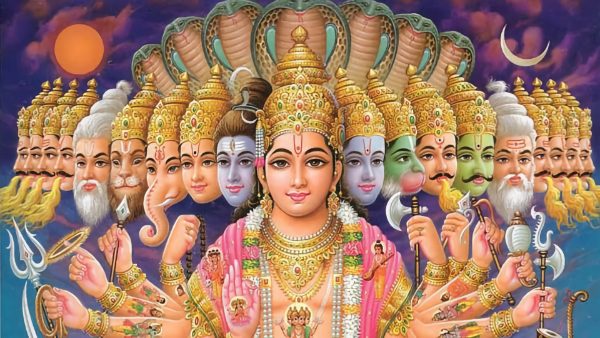
Unfortunately, the Trinity just confused people more. What the theologians should have done is looked to Hinduism for their answer. Hinduism is complex and nuanced but in general Hindus believe in a single divine source called Brahman. All the other Gods — Kali, Ganesh, Vishnu, Shiva, and the others, as well as everything in creation, from humans to hydrogen include a shard of Brahman.
In the Trinity, early Christians nobly tried to explain God as the creative source, Jesus as the source made physical (and symbolic of the entire physical world), and the spirit, or energy force of God that keeps reality fired up. But it is all God. It is all from the same thing, Brahman.
When Jesus says things like, “The Father and I are one,” he’s hinting at Brahman. Early Christians called Jesus Immanuel meaning “With us is God.” Jesus and God and we are not separate beings. We are all aspects of Brahman, of Divine Consciousness, of God, Jesus, Mohammed, Moses, Buddha, and Bruce. We are all part of everyone we love and loathe. Union Square makes that evident.
Honestly, I’m not sure how the Evangelicals hang on to their narrow view. There is such a diversity of faith and so much shared love in the Square that continuing to hold onto a God who condemns everyone but you and your friends must be psychologically damaging. Because Union Square, like New York itself, effortlessly reveals the diversity of God’s magnificence.
Unless, of course, you’re too busy shouting to listen.
Question: What are your religious intolerances and how do you deal with them?

